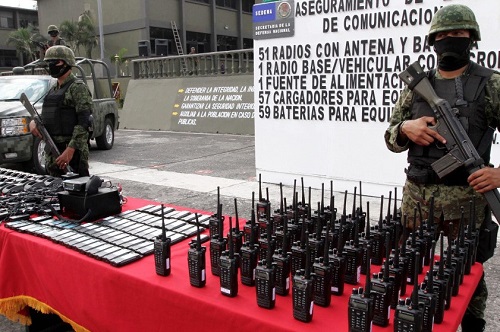AFP photo
By
Ricardo Swire
Transnational drug cartels successfully distribute and transport consignments globally utilizing ultra-secret communications technology. Many hours are spent secretly discussing shipment quantities and price, therefore a coded system that correlates with numbers was introduced. Command, Communications and Control are key elements of the enterprising and fluid system. Over time national security agencies and law enforcement infiltrated private phone companies that specifically supply drug cartels and criminal organizations with unique encrypted mobile phones.
In 2014 thirty-four Dutch law enforcement investigations, which included attempted assassinations and international drugs trafficking cases, involved the use of encrypted phones provided by PGP Sure, a private telecommunications company. Each €1200 mobile handset provided criminal elements with the “Highest Grade Encryption.” In 2017 Politie or national Dutch police force officers arrested three PGP Sure executives in Amsterdam. Previously in April 2013 Politie detectives detained the Ennetcom Encrypted Network’s Chief Executive Officer.
The Netherlands’ largest organized crime communications platform used BlackBerry Enterprise Servers to offer encrypted and secure digital channels to contract killers, drug traffickers and organized crime characters. The modified mobile phones sold for €1500 each. In 2014 the murder of a Hells Angel biker in Australia was linked to encrypted handsets, provided by private encryption company called Phantom Secure. In 2016 US Federal Bureau of Investigations (FBI) special agents, partnering with Canadian counterparts, seized an encrypted BlackBerry from Phantom Securer’s headquarters in Vancouver, Canada.
The encryption Company supplied shadowy customers with BlackBerry phones minus cameras, microphones and standard internet text messaging features. Instead specially encrypted, pre-loaded email software was users’ provided alternatives. One drug trafficker, charged with aiding and abetting, used his Phantom Secure device to coordinate a five kilo cocaine deal. On March 8, 2018 the founder of Phantom Secure, or Phantom Security Communications, was arrested in Washington, US.
FBI agents charged that the Company used its uniquely configured networks to deliberately prevent law enforcement interception and monitoring. Phantom Secure encrypted mobile handsets were provided to several sophisticated organized crime organizations including Mexico’s Sinaloa Cartel. The FBI’s allegation is collaborated by a former Mexican military expert on narcotics. The internal security veteran recalled Mexican military counter-narcotics operations that dismantled private communications centers, towers and repeaters used by “Narcos” based in Coahuila, San Luis Potosi, Tamaulipas and Veracruz.
Between 2008 and 2012 thirty-six civilian communications specialists disappeared in Mexico without a trace or ransom request. In 2009 alone nine contracted Nextel cell-tower technicians vanished from border town Nuevo Laredo in the state of Tamaulipas. The kidnappers returned to collect and remove the team’s equipment and vehicle. In January 2011 an IBM engineer was kidnapped while driving from Monterrey, the capital and largest city of north-eastern state Nuevo León, to Laredo in Texas.
On October 30, 2011 the Mexican Army seized twenty-one antennas, twenty-two repeaters, eighteen duplex components and other communications equipment used by drug cartels headquartered in Reynosa, Tamaulipas. The Gulf Cartel owns an extensive array of antennas, repeaters and digital components that traffickers from both Gulf Cartel and Los Zetas utilize along Mexico’s side of the Texas/Mexico border. The private and secret communications network umbrellas the northwest district Ciudad Acuna across from Del Rio in Texas and Veracruz southeast of Texas, or almost halfway to the Yucatan peninsula.
Ricardo Swire
Ricardo Swire is the Principal Consultant at R-L-H Security Consultants & Business Support Services and writes on a number of important issues.



No Comments Yet!
You can be first to comment this post!